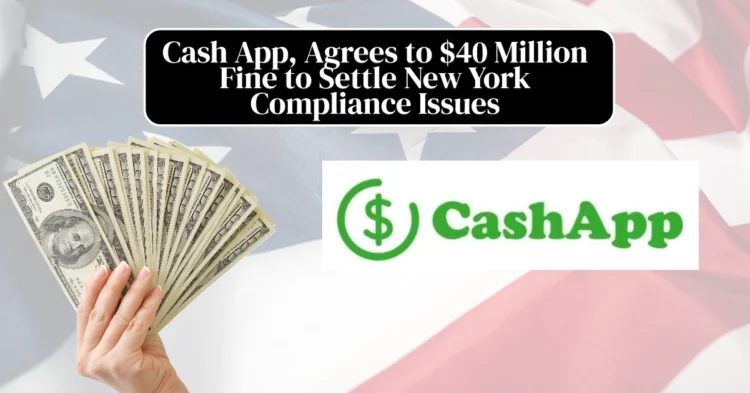Block, the company behind Cash App, has agreed to pay a $40 million civil fine to settle charges from New York’s Department of Financial Services (NYDFS) over allegations that it failed to adequately address money laundering risks on its popular mobile payment service. This settlement is the latest in a series of penalties the company has faced over its regulatory shortcomings related to anti-money laundering (AML) practices. Block has agreed to hire an independent monitor as part of the settlement to ensure future compliance with financial regulations.
Table of Contents
Details of the Settlement and Allegations Against Cash App
The fine stems from an investigation into Block’s handling of its Cash App service, where regulators found significant gaps in the company’s Bank Secrecy Act (BSA) compliance, its anti-money laundering (AML) protocols, and its know-your-customer (KYC) procedures. These regulatory failures created an environment that left the mobile payment app vulnerable to illegal activities like money laundering and terrorism financing.
The New York Department of Financial Services (NYDFS) faulted Block for its inadequate risk-based controls and poor customer due diligence. Specifically, the regulator pointed to Cash App’s lack of robust oversight over bitcoin transactions, a service Cash App began offering in 2018. The regulator further stated that the company’s rapid growth only exacerbated the risk of criminal exploitation on the platform.
One key finding of the investigation was Block’s failure to detect and prevent criminal activities, including the discovery of over 8,000 Cash App accounts tied to a Russian criminal network during an internal investigation in 2022. This revelation raised concerns about the company’s ability to effectively monitor and control the flow of money through its service.
Cash App Settlement 2025: When Will You Get Paid & How to Check Your Payout Status?
Cash App Afterpay 2025: How This New BNPL Partnership is Changing Online Shopping
Block’s Response to the Allegations
In response to the charges, Block, formerly known as Square and led by Twitter co-founder Jack Dorsey, did not admit or deny wrongdoing. However, the company agreed to pay a civil fine of $40 million and bring in an independent monitor to ensure that its policies and practices comply with the required regulatory standards going forward.
Block emphasized that the settlement resolves “all previously pending state money transmission license matters,” marking an end to its ongoing legal troubles with state regulators over its Cash App service. Despite the fine, Block expressed its commitment to enhancing its compliance program and said it is working to strengthen its internal controls to prevent any future breaches of the law.
The Role of Cash App in Block’s Business and Growth
Cash App has been a significant driver of Block’s growth in recent years. In 2024, the app saw $283 billion in inflows and had an impressive 57 million monthly users by the end of the year. These numbers reflect the growing popularity of mobile payment services like Cash App and Venmo, which have made it easier for people to send and receive money in real-time.
However, with this rapid expansion comes a heightened responsibility to ensure that the platform is not being misused for illicit activities. Adrienne Harris, the Superintendent of Financial Services for New York, stressed that compliance functions within financial services companies—including emerging platforms like Cash App—must keep up with the company’s expansion. Failure to do so can expose the company to significant regulatory risks and penalties.
Impact of the Settlement and Future Compliance Measures
The settlement marks a critical turning point for Block and Cash App as the company must now overhaul its internal compliance measures. Hiring an independent monitor is a key step in addressing the NYDFS’s concerns and ensuring that future operations meet the required standards of financial security and regulatory adherence.
As part of its resolution with New York, Block will likely need to implement stronger controls for its cryptocurrency transactions and bolster its overall anti-money laundering efforts. Given the rapid evolution of the financial services industry, especially with the growing integration of cryptocurrency into mainstream apps like Cash App, regulatory compliance will be crucial to maintaining consumer trust and avoiding further legal complications.
Lessons Learned for the Mobile Payment Industry
This settlement highlights the growing regulatory scrutiny that mobile payment services like Cash App and Venmo face. The case underscores the importance of implementing robust AML protocols and continuously monitoring transactions to detect and prevent illegal activities.
For other companies in the fintech and mobile payment space, this serves as a warning to ensure that their compliance measures are not only in place but also scalable as their user base grows. Regulators are increasingly focused on platforms that deal with large amounts of money and cryptocurrencies, and any oversight can result in significant fines and reputational damage.
Conclusion: What’s Next for Cash App and Block?
The $40 million fine and the appointment of an independent monitor represent a significant step for Block in addressing the regulatory concerns surrounding Cash App. As the company works to enhance its compliance framework, its ability to adapt to changing regulations will be tested. In the coming months, Cash App users and investors will be looking closely to see how the company handles these regulatory challenges and if it can maintain its position as one of the top mobile payment services in the market.


One thought on “Block, Owner of Cash App, Agrees to $40 Million Fine to Settle New York Compliance Issues”